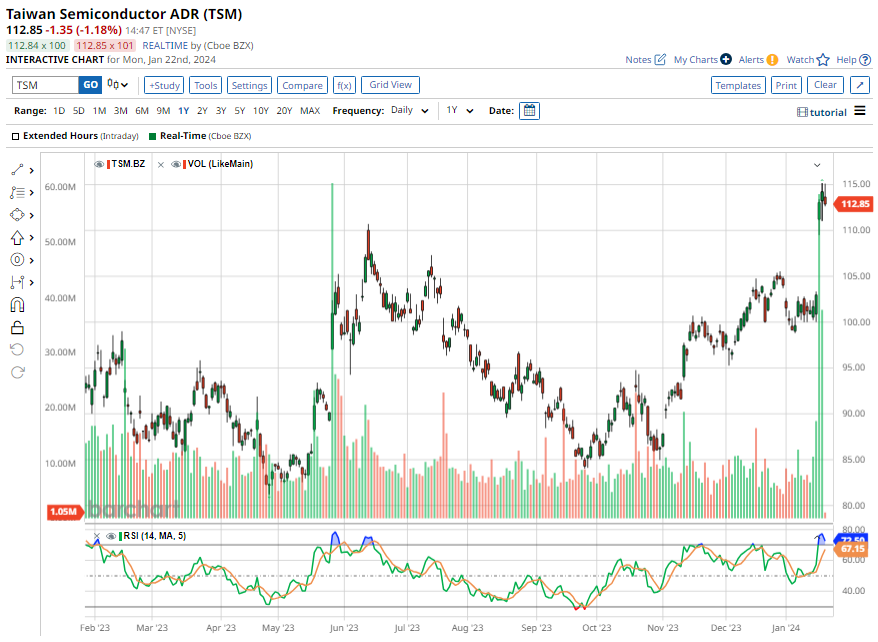The artificial intelligence (AI)-related rally in semiconductor stocks is back with a vengeance in 2024. It all started on Jan. 18 after Taiwan Semiconductor Manufacturing (TSM) – the world’s largest contract chipmaker – forecast a return to strong growth this year. It expects revenues to grow by up to 26% as the global chip market comes out of a deep trough.
The company’s better-than-projected numbers underscored expectations for a bounce-back in smartphone demand, as well as for chips and computing.
But more importantly, the market was excited by the focus of TSM executives on the advent of AI, and how it will turbocharge the chip industry because of its immense computing needs.
Its CEO, CC Wei, said: “We expect 2024 to be a healthy growth year for TSMC, supported by… robust [artificial intelligence] demand.”
That was the shot heard around the financial world. Semiconductor-related stocks all over the globe have been on a tear ever since. On the day of the announcement alone, global chip stocks gained an impressive $160 billion in valuation.
Semiconductor Market Turning Point
The forecast from Taiwan Semiconductor added to the growing confidence that the chip industry left its latest cyclical downturn behind in 2023, and that a “turning point” is at hand for the $600+ billion market.
The latest figures from the U.S.-based Semiconductor Industry Association (SIA), which represents most global chipmakers, had already boosted confidence. It showed that worldwide sales climbed to $48 billion in November, rising on both an annual and quarterly basis for the first time in more than a year. Monthly sales had previously peaked above $50 billion during the first half of 2022.
John Neuffer, SIA chief executive, said the data was “an indication that the global chip market is continuing to gain strength” after its World Semiconductor Trade Statistics unit forecast a “vigorous upswing” in 2024, with global revenues rising 13% to $588 billion.
Taiwan Semiconductor to Stay on Top
The company has benefited from its position as THE go-to supplier for the most advanced chips for companies such as Nvidia (NVDA) and Apple (AAPL), which are prepared to pay more to gain a competitive edge in products that their own customers are willing to shell out for.
The company’s own growth outlook is more than double its forecast for the overall semiconductor market, which CEO Wei said was likely to see an increase of more than 10%.
The latest quarterly numbers back up the optimism of company management. In the fiscal fourth quarter, revenues from high-performance computing applications — which include generative AI — increased by 17% quarter on quarter, while smartphone chip revenues jumped by 27%, and sales from automotive applications were up by 13%.
Make no mistake – TSM is a powerhouse. Taiwan Semiconductor has about 90% of the world’s advanced chip market. And it runs on gross margins of nearly 60%, with about $76 billion in sales a year.
Patents may be the biggest hurdle for the company’s competitors. TSM is one of the world’s largest patent holders, with more than 52,000 of those related to chipmaking. Of that number, around 3,000 are on its advanced packaging — a crucial technology for AI chips that boosts performance, and where Taiwan Semi has the edge over rivals in contract manufacturing. Its over eight years of investment in the technology has pushed the barriers to entry even higher.
At the same time, the company’s fat profit margins mean more cash for research and development, accelerating the pace of next-generation technology releases. TSM spends more than $30 billion in capital expenditure every year.
Wei expects that the annual growth rate for AI computing could reach 50% in the coming years, and said AI processors could account for 15-20% of its revenue in the next five years. The company’s key AI chip clients are the two leaders in the space, Nvidia and Advanced Micro Devices (AMD).
The leading chip technologies are 3 nm (nanometer) and 2 nm. Taiwan Semiconductor meaningfully ramped up its 3 nm production in the second half of 2023. That led to fourth quarter 3 nm revenue of $2.94 billion (15% of total) soaring 184% sequentially from the prior quarter. TSM anticipates a strong continued ramp into 2024, supporting customers in the high-performance computing (HPC). Wei forecast that 3 nm revenue would more than triple in 2024 from 2023 levels, meaning it could represent upward of 20%-25% of total revenue.
The development of 2 nm process node is well-timed to the surging interest in generative AI. TSM anticipates introducing its first 2 nm chips in 2025.
I believe artificial intelligence and high-performance computing will become Taiwan Semiconductor’s most important growth catalysts going forward, replacing mobile communication and smartphone chips, which used to dominate semiconductor demand.
Morgan Stanley analysts in Asia predict that AI-related semiconductors will account for 15% of the company’s revenue by 2027, representing an 18% annual growth rate. The firm also anticipates that high-performance computing, including AI and central processing units computing, may approach 50% of TSM’s total revenue, up from the current 44%.
I also believe that Taiwan Semiconductor is still in the early stages of reaping the benefits that AI brings, as servers are only the initial step of AI adoption. Smartphones and factory equipment, for example, will also need AI capabilities to complete the AI hardware ecosystem.
Add it all up, and TSM stock is a buy at current prices, with a target of at least $150 a share.


